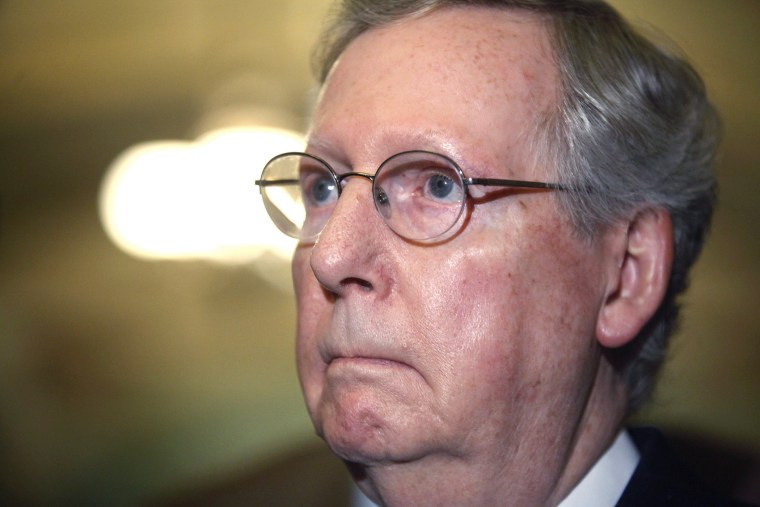Those Beltway assumptions about congressional Republicans steering clear of divisive social issues? They sure were wrong.
Senate Minority Leader Mitch McConnell (R-Ky.) used the anniversary of abortion doctor Kermit Gosnell's trial to call for legislation that would ban abortions after 20 weeks. "It is time for America to join the ranks of most other developed nations around the world and restrict abortion at least at the point at which science tells us that unborn babies are capable of feeling pain," McConnell said Tuesday. "Let's take up this important pro-life legislation and send it to the president."
As a policy matter, 20-week abortion bans would not prevent the Gosnells of the world; they'd arguably do the opposite, forcing desperate women into the hands of dubious "doctors."
What's more, as we've discussed before, because roughly 99% of abortions occur before 21 weeks, these later terminations often involve "rare, severe fetal abnormalities and real threats to a woman's health." It's why the American Congress of Obstetricians and Gynecologists is so strongly against these conservative proposals.
But in all likelihood, this isn't about policy. This is about a senator worried about his red-state re-election while facing a primary challenger.
And what about the bill McConnell is suddenly eager to talk up?
House Republicans approved a 20-week ban last June, and Sen. Marco Rubio (R-Fla.) was supposed to take the lead on pushing an identical bill in the Senate.
For reasons that aren't clear, Rubio, who still backs the legislation, passed the baton to Sen. Lindsey Graham (R-S.C.), who formally introduced S. 1670 in November. It currently enjoys support from 41 of the Senate's 45 Republican members. (It has zero Democratic co-sponsors.)
But it's McConnell's push for a vote that's of particular interest here. He knows it can't pass and won't get President Obama's signature, but the Kentucky Republican is pushing for a vote anyway, in part to pander to his party's base, and in part because the vote would likely prove awkward for red-state Democrats worried about their own re-election.
The culture war has long been a wedge for the GOP, and for McConnell, little has changed.
But Republicans should probably be mindful of unintended consequences. GOP officials spent the last election year working on measures such as restricting contraception, cutting off Planned Parenthood, and requiring medically-unnecessary ultrasounds. The "war on women" helped spur progressive activism and a gender gap that cost a lot of Republican their elections.
Two years later, McConnell apparently wants to see a replay.
